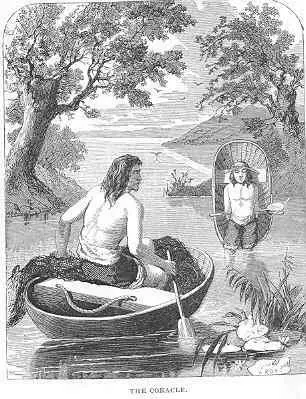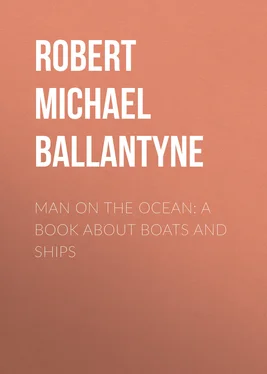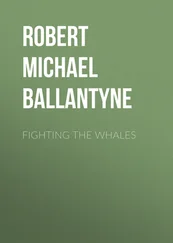Robert Michael Ballantyne - Man on the Ocean - A Book about Boats and Ships
Здесь есть возможность читать онлайн «Robert Michael Ballantyne - Man on the Ocean - A Book about Boats and Ships» — ознакомительный отрывок электронной книги совершенно бесплатно, а после прочтения отрывка купить полную версию. В некоторых случаях можно слушать аудио, скачать через торрент в формате fb2 и присутствует краткое содержание. Жанр: foreign_desc, Технические науки, на английском языке. Описание произведения, (предисловие) а так же отзывы посетителей доступны на портале библиотеки ЛибКат.
- Название:Man on the Ocean: A Book about Boats and Ships
- Автор:
- Жанр:
- Год:неизвестен
- ISBN:нет данных
- Рейтинг книги:5 / 5. Голосов: 1
-
Избранное:Добавить в избранное
- Отзывы:
-
Ваша оценка:
- 100
- 1
- 2
- 3
- 4
- 5
Man on the Ocean: A Book about Boats and Ships: краткое содержание, описание и аннотация
Предлагаем к чтению аннотацию, описание, краткое содержание или предисловие (зависит от того, что написал сам автор книги «Man on the Ocean: A Book about Boats and Ships»). Если вы не нашли необходимую информацию о книге — напишите в комментариях, мы постараемся отыскать её.
Man on the Ocean: A Book about Boats and Ships — читать онлайн ознакомительный отрывок
Ниже представлен текст книги, разбитый по страницам. Система сохранения места последней прочитанной страницы, позволяет с удобством читать онлайн бесплатно книгу «Man on the Ocean: A Book about Boats and Ships», без необходимости каждый раз заново искать на чём Вы остановились. Поставьте закладку, и сможете в любой момент перейти на страницу, на которой закончили чтение.
Интервал:
Закладка:
R. M. Ballantyne
Man on the Ocean: A Book about Boats and Ships
Chapter One.
Treats of Ships in General
There is, perhaps, no contrivance in the wide world more wonderful than a ship—a full-rigged, well-manned, gigantic ship!
Those who regard familiar objects in art and nature as mere matters of course, and do not trouble themselves to wander out of the beaten track of everyday thought, may not at first feel the force or admit the truth of this statement. Let such folk endeavour to shake themselves vigorously out of this beaten track of everyday thought. Let them knit their brows and clench their teeth, and gaze steadfastly into the fire, or up at the sky, and try to realise what is involved in the idea of—a ship.
What would the men of old have said, if you had told them that you intended to take yonder large wooden house, launch it upon the sea, and proceed in it out of sight of land for a few days? “Poor fellow,” they would have replied, “you are mad!” Ah! many a wise philosopher has been deemed mad, not only by men of old, but by men of modern days. This “mad” idea has long since been fulfilled; for what is a ship but a wooden house made to float upon the sea, and sail with its inmates hither and thither, at the will of the guiding spirit, over a trackless unstable ocean for months together? It is a self-sustaining movable hotel upon the sea. It is an oasis in the desert of waters, so skilfully contrived as to be capable of advancing against wind and tide, and of outliving the wildest storms—the bitterest fury of winds and waves. It is the residence of a community, whose country for the time being is the ocean; or, as in the case of the Great Eastern steamship, it is a town with some thousands of inhabitants launched upon the deep.
Ships are, as it were, the electric sparks of the world, by means of which the superabundance of different countries is carried forth to fill, reciprocally, the voids in each. They are not only the media of intercourse between the various families of the human race, whereby our shores are enriched with the produce of other lands, but they are the bearers of inestimable treasures of knowledge from clime to clime, and of gospel light to the uttermost ends of the earth.
But for ships, we should never have heard of the wonders of the coral isles and the beauties of the golden South, or the phenomena and tempests of the icy North. But for ships, the stirring adventures and perils of Magellan, Drake, Cook, etcetera, had never been encountered; and even the far-famed Robinson Crusoe himself had never gladdened, and saddened, and romantically maddened the heart of youth with his escapes, his fights, his parrots, and his philosophy, as he now does, and as he will continue to do till the end of time.
Some account, then, of ships and boats, with anecdotes illustrative of the perils to which they are frequently exposed, cannot fail, we think, to prove interesting to all, especially to boys, for whose particular edification we now write. Boys, of all creatures in this world, are passionately fond of boats and ships; they make them of every shape and size, with every sort of tool, and hack and cut their fingers in the operation, as we know from early personal experience. They sail them, and wet their garments in so doing, to the well-known sorrow of all right-minded mammas. They lose them, too, and break their hearts, almost, at the calamity. They make little ones when they are little, and big ones when they grow big; and when they grow bigger they not unfrequently forsake the toy for the reality, embark in some noble craft, and wed the stormy sea.
A word in your ear, reader, at this point. Do not think that because you fall in love with a ship you will naturally and necessarily fall in love with the sea ! Some do, and some don’t: with those who do, it is well; with those who don’t, and yet go to sea, it is remarkably ill. Think philosophically about “going to sea,” my lads. Try honestly to resist your own inclination as long as possible , and only go if you find that you can’t help it ! In such a case you will probably find that you are cut out for it—not otherwise. We love the sea with a true and deep affection, and often have we tossed upon her foam-topped waves; but we don’t wish to be a sailor—by no manner of means!
And now, boys, come along, and we will conduct you as pleasantly and profitably as we can from a ship’s cradle, through all her stormy existence, to her grave.
Chapter Two.
The Earliest Days of Water-Travelling
Once upon a time there were no ships. Men did not know the meaning of the word; they did not want them; and, for many, many centuries the sea-gulls had the ocean all to themselves. But boats are of very ancient date. Doubtless the first boats must have been constructed by the first men who dwelt on the earth. They consisted, probably—for we are now in the land of conjecture—of stumps of fallen trees, or bundles of rushes, seated astride of which the immediate descendants of our first parents ferried themselves over small lakes and across rivers.
Wet feet are not agreeable under any circumstances. We can conceive that prolonged voyages performed in this fashion—say several hundred yards or a mile—rendered those primitive mariners so uncomfortable, that they resolved to improve their condition; and, after much earnest thought, hit upon the plan of fastening several logs together by means of twigs, and thus they formed rafts .

As time progressed, and men began to display wisdom in making tools of stone and in the moulding of metal, we can imagine that they soon bethought themselves of flattening the surface of their rafts; and then, finding them unwieldy and difficult to manage, no doubt, they hit upon the idea of hollowing out the logs. Adzes were probably not invented at that time, so they betook themselves to the element of fire—which is at the present day used by savage nations for the same purpose—and burned out the insides of their logs. Thus canoes sprang into being.
But such canoes were clumsy and heavy, besides being liable to split; men therefore bethought themselves of constructing a light framework of wood, which they covered with bark or skin. Then artificers in iron invented saws; logs were ripped up; planks were formed; pitch oozed ready to hand from the trees; with grass, perchance, they caulked the seams;—and soon the first boat floated on the water—clumsy and tub-like, no doubt, but serviceable withal—and youths of a hundred years old, and full-grown men of two or three hundred, capered and shouted on the shore with delight at the great invention; while venerable patriarchs, of seven or eight hundred summers, gazed in wonder, with almost prophetic solemnity, and exclaimed that they had never before seen the like of that in all the course of their long, long lives!
Those times are old now—so old that men can scarcely get their minds to realise how old they are; nevertheless, the craft that were used then are used even now, and that not only among the savages of distant lands, but by men living at our very doors.

The coracle , a basket-boat of the most primitive description, is still occasionally met with in South Wales. It is neither more nor less than a large wicker basket covered with a hide, and is tub-shaped, and clumsy to a degree. When the Romans invaded Britain, this species of boat was in common use. Like the canoe of the North American Indian, it is easily upset, and we should think must be rather unmanageable; but as we are not likely ever again to be reduced to it in this country, we can afford to regard its faults with indifference.
Читать дальшеИнтервал:
Закладка:
Похожие книги на «Man on the Ocean: A Book about Boats and Ships»
Представляем Вашему вниманию похожие книги на «Man on the Ocean: A Book about Boats and Ships» списком для выбора. Мы отобрали схожую по названию и смыслу литературу в надежде предоставить читателям больше вариантов отыскать новые, интересные, ещё непрочитанные произведения.
Обсуждение, отзывы о книге «Man on the Ocean: A Book about Boats and Ships» и просто собственные мнения читателей. Оставьте ваши комментарии, напишите, что Вы думаете о произведении, его смысле или главных героях. Укажите что конкретно понравилось, а что нет, и почему Вы так считаете.












